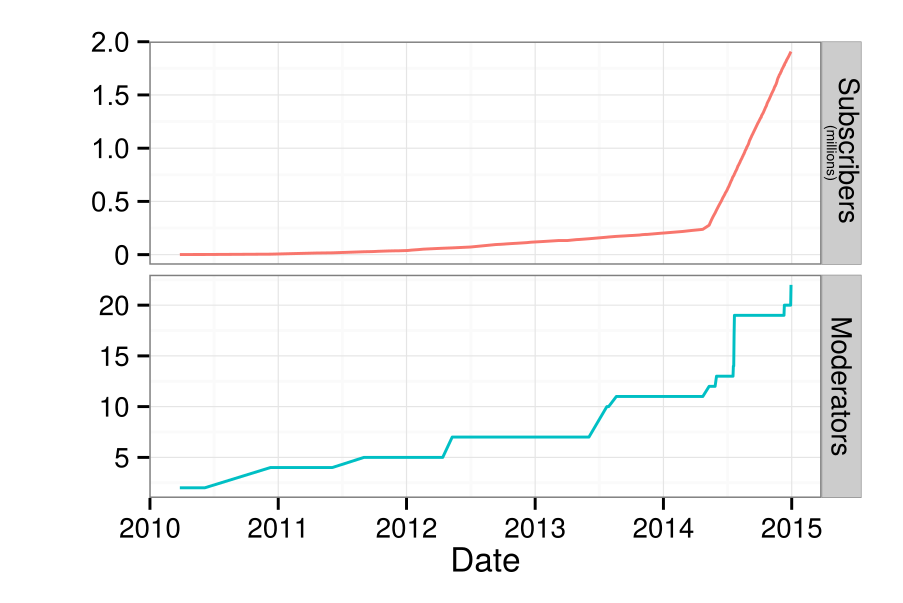Attracting newcomers is among the most widely studied problems in online community research. However, with all the attention paid to challenge of getting new users, much less research has studied the flip side of that coin: large influxes of newcomers can pose major problems as well!
The most widely known example of problems caused by an influx of newcomers into an online community occurred in Usenet. Every September, new university students connecting to the Internet for the first time would wreak havoc in the Usenet discussion forums. When AOL connected its users to the Usenet in 1994, it disrupted the community for so long that it became widely known as “The September that never ended.”
Our study considered a similar influx in NoSleep—an online community within Reddit where writers share original horror stories and readers comment and vote on them. With strict rules requiring that all members of the community suspend disbelief, NoSleep thrives off the fact that readers experience an immersive storytelling environment. Breaking the rules is as easy as questioning the truth of someone’s story. Socializing newcomers represents a major challenge for NoSleep.

On May 7th, 2014, NoSleep became a “default subreddit”—i.e., every new user to Reddit automatically joined NoSleep. After gradually accumulating roughly 240,000 members from 2010 to 2014, the NoSleep community grew to over 2 million subscribers in a year. That said, NoSleep appeared to largely hold things together. This reflects the major question that motivated our study: How did NoSleep withstand such a massive influx of newcomers without enduring their own Eternal September?
To answer this question, we interviewed a number of NoSleep participants, writers, moderators, and admins. After transcribing, coding, and analyzing the results, we proposed that NoSleep survived because of three inter-connected systems that helped protect the community’s norms and overall immersive environment.
First, there was a strong and organized team of moderators who enforced the rules no matter what. They recruited new moderators knowing the community’s population was going to surge. They utilized a private subreddit for NoSleep’s staff. They were able to socialize and educate new moderators effectively. Although issuing sanctions against community members was often difficult, our interviewees explained that NoSleep’s moderators were deeply committed and largely uncompromising.
That commitment resonates within the second system that protected NoSleep: regulation by normal community members. From our interviews, we found that the participants felt a shared sense of community that motivated them both to socialize newcomers themselves as well as to report inappropriate comments and downvote people who violate the community’s norms.
Finally, we found that the technological systems protected the community as well. For instance, post-throttling was instituted to limit the frequency at which a writer could post their stories. Additionally, Reddit’s “Automoderator”, a programmable AI bot, was used to issue sanctions against obvious norm violators while running in the background. Participants also pointed to the tools available to them—the report feature and voting system in particular—to explain how easy it was for them to report and regulate the community’s disruptors.
This blog post was written with Benjamin Mako Hill. The paper and work this post describes is collaborative work with Benjamin Mako Hill and Andrés Monroy-Hernández. The paper was published in the Proceedings of CHI 2016 and is released as open access so anyone can read the entire paper here. A version of this blogpost was posted on Benjamin Mako Hill’s blog Copyrighteous.
If anyone is interested, Stanford’s CS department was inspired by this paper and tested the “natural experiment” of defaulting subreddit communities across multiple subreddits that became a default around the same time as /r/nosleep.
Their paper can be read here:
http://hci.stanford.edu/publications/2017/eternalseptember/eternalseptember.pdf
Let’s write another blog post around that! Since the paper was just published it’d be good to do this soon!